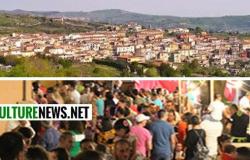«Ah, if those walls could Not speak!” he exclaimed the outsider as he was preparing to return to visit his ancient headquarters, under the arcades. He returns precisely to say something about the venue itself and its porticoes. Because – perhaps more than any other location – Bologna also corresponds to the history of what happened in Bologna to those who happened to live there, in Bologna, perhaps just passing through, on the sly. A living there without really being there, something out of the way.
Today we call it storytelling, because in English it doesn’t seem to be the same thing, but it’s been a long time since the Turrita City has also been the Narrated City, Bologna the Learned is Bologna the Said, between large squares, out-of-town taverns, gypsies and crazy hares , de-ambient anchovies and more dissolute than de-salted, hot air balloons, Boccaloni, Libertini and Pentothal… Has Jack Frusciante ever left the porch? These are stories known to everyone, but then the porticoes reverberate with all the narrative orality that he has traveled through them and also with that which the porticoes themselves can be said to have generated. This is why the off-site repeats it again.
Ah if those walls could not speak! But no, they know a lot and they say it all, because a portico is not a portico but is a newspaper, a radio, a publishing house, a pneumatic post that runs under the vaults, a field that is always well connected; and a city of arcades is a cellular network, a brick wifi, an Internet of which the doors are the providers. Poets give names to the tavern but the tavern is history, practically the word itself says so. The columns of the porticoes are printed, stone and ink columns. On one of these, a couple of years ago, the outsider found, written in marker, a palindrome that he himself had described years earlier in the newspaper, vaguely described and not transcribed literally, because in five words it managed to contain blasphemy, bodyshaming and ableism.
You can’t do it in the newspaper, but you can on the porch. Good or bad? What questions, the porticoes are evidently beyond good and evil, the campers of Piazza Verdi at the off-site taught it already on the first visit after its registration when in broad daylight a girl spread her legs under her skirt right in front of the theater and the same pool described by Gadda in the Cognition of Pain was generated, the work of a fishmonger called Beppina, «well known throughout the territory […] for his hasty and rather Amazonian way of taking a piss (time is money)”.
That time. It was right here. From behind the column, against that step, from that shop, on the stall, the girl, the bicycle, a book, the ice cream: poetic porches and prosaic porches, tropical porches and too many porches. Because then the porch becomes too much, you don’t care anymore and so you expose yourself to make those voices fall asleep, slow down their rebound. If those walls could not speak you could fall asleep, but if your room is right up there it is likely that with their sound box the porticos will carry up to the third floor the nocturnal sigh of a pedalling, the rustle of the street cleaners’ broom, the rolling of a small stone kicked by a pre-dark passer-by.
It could be the manifestation of nothing that happened or it could be the hint of a possibility that was immediately withdrawn and disappeared: the clue to a beginning, which will be lost from porch to porch like the details of a story heard in the half asleep.






